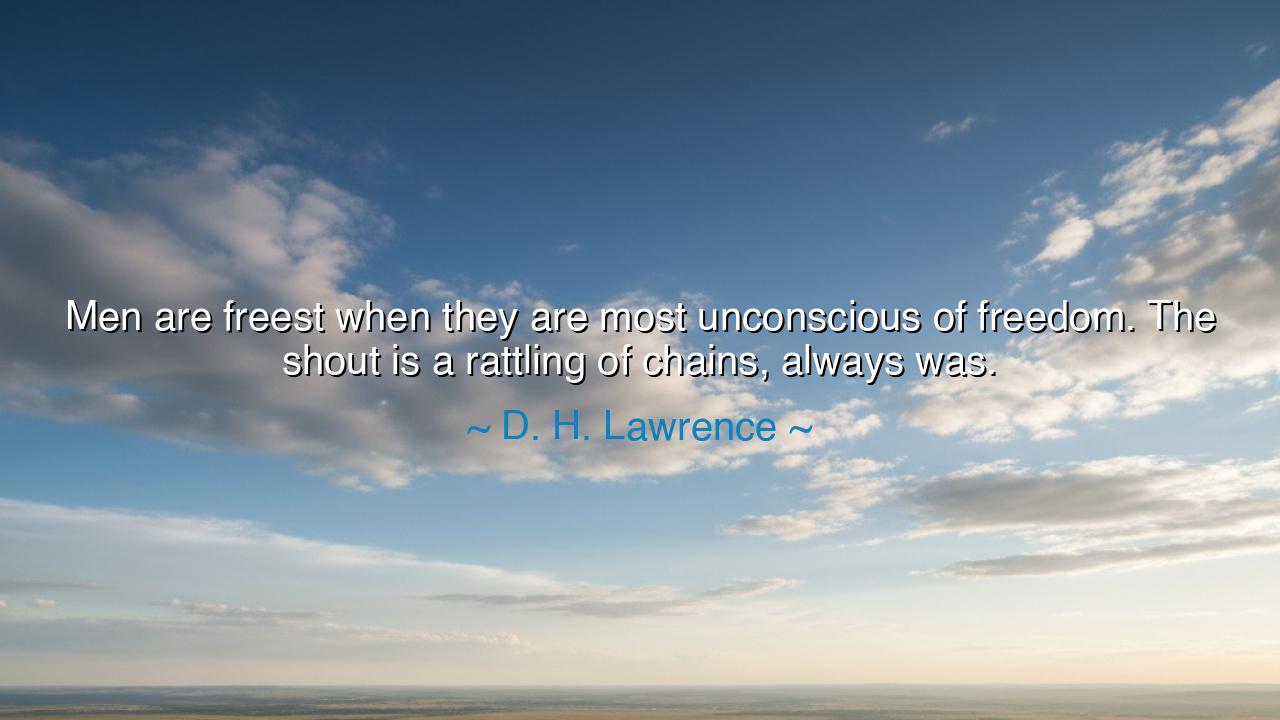
Men are freest when they are most unconscious of freedom. The
Men are freest when they are most unconscious of freedom. The shout is a rattling of chains, always was.






Host: The night had swallowed the city whole. From the cracked window of an old warehouse, the light of the streetlamps spilled in pale amber, catching on particles of dust that drifted like forgotten seconds. The air inside was heavy with the scent of iron, rain, and old paint.
In the center of the dim room, Jack sat on a broken wooden crate, smoking quietly. The flame from his lighter flared and vanished, leaving his face half in shadow — a portrait of a man thinking too hard to find rest.
Jeeny stood by the window, her small frame outlined by the light outside. She wasn’t looking at him — not yet. She was watching the street, where a group of young protesters marched by, chanting through the cold air:
“Freedom! Justice! Change!”
The echoes of their voices bounced off the brick walls like restless ghosts.
Jeeny: “D. H. Lawrence once said, ‘Men are freest when they are most unconscious of freedom. The shout is a rattling of chains, always was.’”
She turned, her voice trembling slightly — not from fear, but from the weight of truth. “Do you think he was right, Jack? That freedom isn’t what we think it is?”
Jack: He flicked ash onto the floor, his eyes grey, reflective. “Lawrence was too clever for slogans. He knew shouting about freedom is just another form of dependence. If you need to prove you’re free, you’re already chained to the idea of it.”
Jeeny: “But how else do you fight for it? If no one shouts, who hears?”
Jack: “You don’t shout,” he said, standing, his voice low but firm. “You live it. Quietly. Relentlessly. Real freedom isn’t a banner, Jeeny — it’s invisible. It’s how you think when no one’s watching. It’s the decisions you make without permission.”
Host: His shadow stretched long across the concrete, touching her shoes, faintly trembling as if the air between them carried an unseen tension. The protest chants outside rose and fell — a distant wave breaking against the indifference of skyscrapers.
Jeeny: “You talk like freedom’s a secret,” she said softly. “But secrets rot when they’re not shared. Those kids outside — maybe their shouting isn’t a chain. Maybe it’s a key.”
Jack: “Or maybe it’s noise. The illusion of rebellion sold as catharsis. They’ll shout until their throats bleed, then go home and scroll through advertisements telling them who to be next.”
Host: The wind outside whistled through the cracked glass, carrying faint echoes of the word liberty. Inside, it died quickly, suffocated by the quiet weight of Jack’s cynicism.
Jeeny crossed her arms, her eyes steady now — fierce.
Jeeny: “You think cynicism makes you wise, but it just makes you lonely. Maybe they won’t change the world tonight. But they’re trying. That’s more than the ones who watch from windows and call it insight.”
Jack: “You think I’m judging them? I envy them. I remember when I still believed shouting could move mountains. But the truth, Jeeny — the brutal truth — is that mountains don’t move for noise. They move for silence. For patience. For those who plant dynamite quietly beneath them while the world’s distracted by chants.”
Host: Her eyes flashed. The storm in her was quiet but relentless — the kind that doesn’t need thunder to destroy.
Jeeny: “You mistake silence for wisdom, Jack. Sometimes silence is just fear with manners.”
Jack: “And sometimes noise is just fear in costume.”
Host: The rain began to fall again, heavy and sudden. The sound against the tin roof was deafening — a thousand small hands beating in unison, nature’s own applause for their argument.
For a moment, neither spoke. The only sound was the rain and the soft hiss of Jack’s cigarette dying out.
Jeeny: “So what then?” she asked quietly. “If shouting is a chain, and silence is surrender — what does freedom even look like?”
Jack: “It looks like not needing to ask that question.”
Jeeny: “That’s not an answer.”
Jack: “It’s the only one there is.”
Host: Her jaw tightened. She turned away from him, staring again through the window where the protesters’ lights flickered in the wet darkness — flashes of red and white like tiny heartbeats.
Jeeny: “You sound like someone who’s given up.”
Jack: “No,” he said softly, “like someone who’s woken up.”
Jeeny: “To what?”
Jack: “To the fact that freedom’s not a trophy. It’s not granted, it’s not won — it’s realized. And the moment you start to measure it, you’ve already lost it.”
Host: The words hung heavy in the air. The rain slowed, then softened into a whisper. Somewhere outside, a police siren rose — distant, mournful — then faded into the night.






AAdministratorAdministrator
Welcome, honored guests. Please leave a comment, we will respond soon